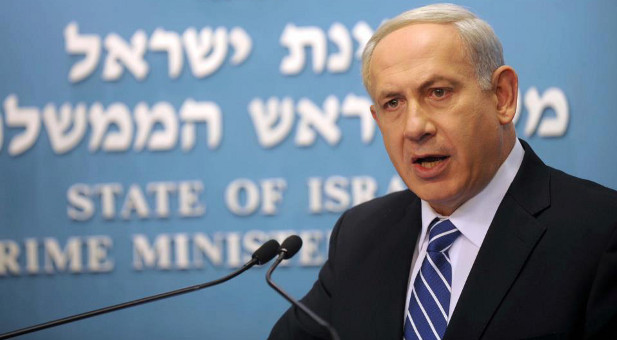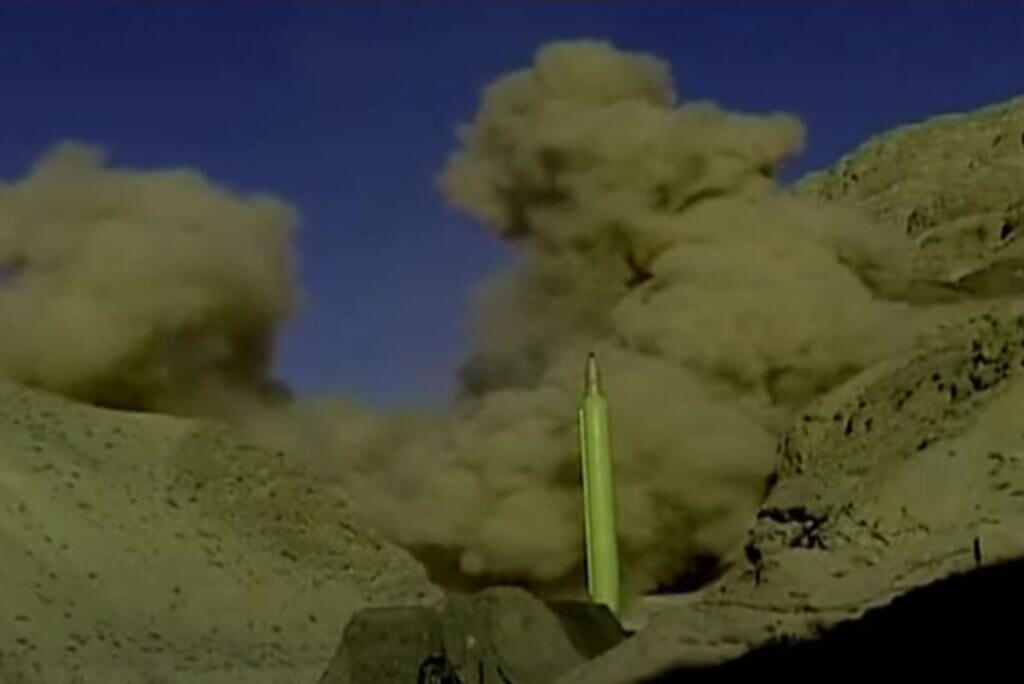Prime Minister Benjamin Netanyahu addressed the Saban Forum in Washington on Sunday via video conference and illustrated a clear link between the Iranian nuclear threat and the Israeli-Palestinian peace talks, saying that if Iran crossed the nuclear threshold, there would be no real chance for peace with the Palestinian Authority.
“Our best efforts to reach Palestinian-Israeli peace will come to nothing if Iran succeeds in building atomic bombs,” Netanyahu said. “A nuclear-armed Iran would give even greater backing to the radical and terrorist elements in the region. It would undermine the chances of arriving at a negotiated peace. I would say it would undermine those peace agreements that we have already reached with two of our neighbors.”
But speaking to Army Radio on Monday, U.S. Ambassador to Israel Dan Shapiro contradicted the prime minister, saying the two issues are unrelated.
Speaking in Hebrew, Shapiro said, “The issues of putting a stop to Iran’s nuclear program and that of the peace talks with the Palestinians are not connected. These issues are relevant to the security of Israel and the United States both, as well as for the security and stability of the entire Middle East, but they have no quid pro quo relationship.”
In his speech, Netanyahu expressed his gratitude to both U.S. President Barack Obama and Secretary of State John Kerry for their tireless efforts to promote a peace deal, saying, “The Middle East is going through unprecedented volatility, violence and instability. Out of all this uncertainty, one thing has become absolutely clear: The Israeli-Palestinian conflict is not the source of the region’s problems.
“This is not to say that peace with the Palestinians is not important. It’s vital—first and foremost for Israel and the Palestinians. Achieving a genuine and enduring peace between us is a strategic goal of the state of Israel and of my government. I’ve made hard decisions to further peace negotiations. I’m willing to make even harder decisions to achieve peace.”
Netanyahu continued, “I hope President Abbas also is willing to do so because peace can only be and must be a two-way street. I am ready for a historic compromise that ends the conflict between us once and for all. … Under successive governments, Israel has demonstrated the flexibility and the willingness to make painful concessions. … Six successive Israeli prime ministers, myself included, have been ready for a historic compromise with the Palestinians. … But it was never enough. Because all the Israeli proposals, all the Israeli concessions, were based on one premise: that the conflict would be over, that it would end and that there would be no further Palestinian national claims on the Jewish state.
“So the question shouldn’t be, why does Israel make this demand? The question should be, why do the Palestinians consistently refuse to accept it? After all, we recognize that in peace there will be a nation state for the Palestinian people. And surely we are entitled to expect them to do the same: to recognize the nation state of the Jewish people.
“We’ve only been around here for 4,000 years—well, a little less, 3,700 years. We have to have the Palestinians come to grips with the fact that there is going to be a Jewish state, a Jewish nation state here next to their state. It’s not too much to ask. It’s the minimal requirement for peace.”
As for a future peace deal, Netanyahu said, “I think that any kind of peace we’ll have is likely, initially at least, to be a cold peace. And it must withstand the forces of terrorism and the ravaging forces of radicalism and all the forces backed by Iran and others that will try to unravel the peace. And therefore any agreement that we make must enable us to protect the peace or conversely to protect Israel in case the peace unravels.”
‘Talk Has Consequences’
Speaking of the Iranian threat, Netanyahu said, “Just three days ago, Iran’s representative to the U.N. reiterated the regime’s refusal to even recognize Israel. … He said we were doomed to ‘failure and annihilation.’ So the Iranian regime’s pursuit of nuclear weapons makes these remarks more than a simple matter of ‘sticks and stones.’ People tend to discount rhetoric from rogue regimes … [but] talk has consequences, especially when the regime that makes these statements is actually building the capability to carry it out.”
“This same regime supplies its terrorist proxies, Hezbollah, Hamas and Islamic Jihad, with thousands of rockets. … This is a regime committed to our destruction,” Netanyahu warned.
“I believe there must be an unequivocal demand alongside the negotiations in Geneva for a change in Iranian policy. This must be part and parcel of the negotiations. In other words, I’m saying that what is required is not merely a shift and a diminution of Iran’s capability and elimination of its capability to produce nuclear weapons, but also a demand to change its genocidal policy. That is the minimal thing that the international community must do when it’s negotiating with Iran.
“I don’t think I can overstate—I don’t think any of us can overstate—the Iranian danger. So for the peace and security of the world, Iran must not be allowed to maintain the capability to produce nuclear weapons—not today and not tomorrow.”
The prime minister spoke of the importance of the Western-imposed sanctions on Iran, saying, “Steps must be taken to prevent further erosion of the sanctions. Because ultimately, the sanctions remain an essential element of the international effort to compel Iran to dismantle its nuclear military infrastructure: to take apart the centrifuges; to tear down the heavy-water reactor; to eliminate the current stockpiles of enriched uranium; to cease the development of ballistic missiles and the work on weaponization, which by the way the Geneva agreement does not address. None of these things that Iran insists it must have—none of them is necessary for a peaceful nuclear program.
“So while Israel is prepared to do what is necessary to defend itself, we share President Obama’s preference to see Iran’s nuclear weapons program end through diplomacy. But for diplomacy to succeed, it must be coupled with powerful sanctions and a credible military threat. Now let me repeat that: A diplomatic solution is better than a military option. But a military option is necessary for diplomacy to succeed, as are powerful sanctions.”
Israel-U.S. Ties Strong
The prime minister, whose speech concluded the Saban Forum, stressed that despite media reports, the U.S. and Israel enjoy a warm and close relationship.
“The special bond between Israel and the United States is a crucial anchor of stability” in a time of turmoil in the Middle East, Netanyahu said.
“I want to thank President Obama for his commitment to our strong alliance,” he continued. “He has repeatedly said that Israel must have the right to defend itself by itself against all threats. I think that’s a very important statement. It will follow us 360 degrees. And on President Obama’s watch, defense, security and intelligence cooperation between the United States and Israel—this cooperation has reached new heights.
“I want you to know that we can have different perspectives … [but] most of the time and on most things, if not the major things, we see eye to eye because we share common values, because we’re anchored in deeply democratic societies, because there is a special bond between the people of Israel and the people of the United States of America.
“Sometimes we differ because we have these different perspectives. But we always share our views honestly, sincerely and respectfully. That’s what good friends do, and that’s what we’ll continue to do.”
For the original article, visit israelhayom.com.
See an error in this article?
To contact us or to submit an article























